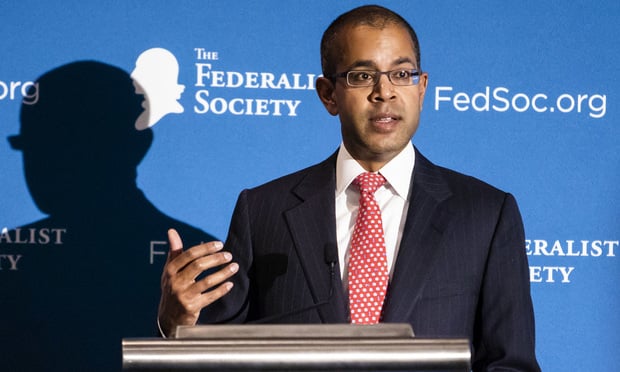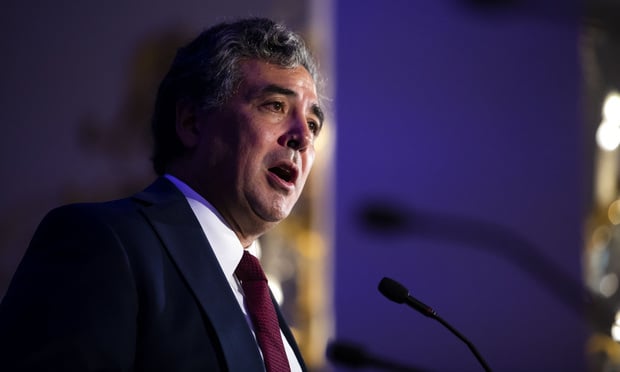Paul Weiss Takes a Sideswipe at Gibson Dunn in New SCOTUS Brief in Consumer Bureau Case
Paul Weiss appellate leader Kannon Shanmugam wants the U.S. Supreme Court to take his challenge to the Consumer Financial Protection Bureau. The court received a new and competing petition, from Gibson, Dunn & Crutcher, a few days ago.
October 04, 2019 at 03:17 PM
6 minute read
The original version of this story was published on National Law Journal
 Kannon Shanmugam of Paul Weiss speaks last year at a Federalist Society event in D.C. Photo: Diego M. Radzinschi/ALM
Kannon Shanmugam of Paul Weiss speaks last year at a Federalist Society event in D.C. Photo: Diego M. Radzinschi/ALM
Updated at 3:53 p.m.
A prominent Washington appellate lawyer who is seeking to challenge the Consumer Financial Protection Bureau in the U.S. Supreme Court took a dig Friday at competing bids to contest the agency's constitutionality in the upcoming term.
In a filing with the high court, Paul, Weiss, Rifkind, Wharton & Garrison partner Kannon Shanmugam appeared to take issue with a rival appellate team's suggestion that his case would not raise an important question for the justices: What relief should be given to financial companies if the CFPB is ultimately found unconstitutional?
An appellate team at Gibson, Dunn & Crutcher—including former U.S. Solicitor General Theodore Olson and Helgi Walker, a leader of the firm's regulatory group—had argued earlier in the week that its own challenge to the CFPB would more directly address that question.
Shanmugam on Friday described as "puzzling" the Gibson Dunn team's contention that his challenge was lacking. He argued his case inherently raises that same question presented in Gibson Dunn's petition.
"Parties do not seek this court's review on constitutional questions for kicks; they do so in order to obtain meaningful relief," Shanmugam wrote. "Accordingly, when the court hears constitutional cases, it routinely proceeds to consider and decide the appropriate remedy upon finding a constitutional violation, regardless of whether the petition itself presented a separate remedial question."
The Paul Weiss reply brief does not name Gibson Dunn but instead refers to the firm's client, All American Check Cashing, a Mississippi-based company that has challenged the CFPB's constitutionality in the U.S. Court of Appeals for the Fifth Circuit. Although the appeals court has not ruled in that case, the Gibson Dunn team opted to seek the Supreme Court's review nonetheless. They argued the question of the CFPB's constitutionality had been adequately considered by lower courts across the country.
Shanmugam, noting that the Fifth Circuit had yet to rule in Gibson Dunn's case, described the competing firm's petition as "unusual," saying it asked for "the extraordinary remedy of certiorari before judgment."
Gibson Dunn's Walker said Friday: "We look forward to addressing the arguments that Seila Law has made about the All American petition in our reply. For now, I would note that Seila Law does not disagree that the remedies question is an essential piece of the constitutional puzzle that the court should address, as we have argued—our case is the ideal vehicle for addressing that important practical issue."
 Helgi Walker of Gibson Dunn & Crutcher.
Helgi Walker of Gibson Dunn & Crutcher.The design of the CFPB, a regulatory agency born from the Dodd-Frank reforms that followed the financial crisis, has long rankled the business advocates and Republicans on Capitol Hill. At issue is whether the CFPB's independent, single-director structure—designed to protect the agency's leader from being fired at will by the president—violates the Constitution's separation of powers clause.
For years, the CFPB defended its constitutionality with the backing of the U.S. Justice Department. But under the Trump administration, the Justice Department and even the CFPB itself have abandoned that stance and argued that the Supreme Court should strike down the agency's structure.
Lawyers for the U.S. House of Representatives, lining up against the Trump administration's Justice Department, on Friday urged the U.S. Supreme Court not to disturb a the Ninth Circuit ruling in the Seila Law case that kept in place the single-director structure of the consumer bureau.
The House legal team, led by general counsel Douglas Letter, said Democrats should be allowed to back the consumer bureau as a friend-of-the-court because Main Justice and the agency itself were no longer defending the constitutionality of the single-design scheme.
 U.S. Solicitor General Noel Francisco. Photo: Diego M. Radzinschi / NLJ
U.S. Solicitor General Noel Francisco. Photo: Diego M. Radzinschi / NLJ"The Solicitor General has decided not to defend this Act of Congress, and the House should be allowed to do so as an amicus," Letter said in a new filing in the case Seila Law v. CFPB.
The consumer agency's notification of its switched position meant that the House could not earlier file a friend-of-the-court brief supporting the single-director design, Letter said in Friday's filing in the Supreme Court.
Central to the challenges to the consumer bureau's structure are Supreme Court separation-of-powers rulings in Humphrey's Executor v. United States (1935) and Morrison v. Olson (1988).
The Justice Department's brief said in its brief that the Supreme Court "should consider" overturning those two rulings if the justices conclude they cannot get around them to declare the independent CFPB director as unlawful.
In his brief Friday, Letter took a dig at the mere suggestion the court would entertain overturning those two earlier rulings.
"While the Solicitor General might prefer an executive branch without any independent regulatory agencies, there is no sound reason for this court to overrule eighty years of precedent that has played a significant role in shaping our modern system of government," Letter wrote. "Nor is there any basis for this court to strip Congress of its authority to create agencies with a measure of independence from presidential control, where such a structure 'is necessary to the proper functioning of the agency or official.'"
Read more:
Appellate Veterans Jockey at SCOTUS to Contest Consumer Bureau
Can Kannon Shanmugam Make Paul Weiss 'The Best Little Law Firm' in Washington?
CFPB, Changing Stance, Backs Law Firm Fighting Agency's Independent Design
Current and Former Texas Solicitors General Line Up Against CFPB
Gibson Dunn's Ted Olson Puts New Squeeze on Consumer Bureau
D.C. Circuit's Brett Kavanaugh Doubles Down on Criticism of CFPB
This content has been archived. It is available through our partners, LexisNexis® and Bloomberg Law.
To view this content, please continue to their sites.
Not a Lexis Subscriber?
Subscribe Now
Not a Bloomberg Law Subscriber?
Subscribe Now
NOT FOR REPRINT
© 2025 ALM Global, LLC, All Rights Reserved. Request academic re-use from www.copyright.com. All other uses, submit a request to [email protected]. For more information visit Asset & Logo Licensing.
You Might Like
View All
Litigators of the Week: The Eighth Circuit Knocks Out a $564M Verdict Against BMO in Ponzi Case

Litigators of the Week: Second Circuit Tells Argentina to Turn Over More Than $300M to Bondholders

How One of the World's Largest Institutional Investors Approaches Litigation

Big Law and Litigation Finance Seem to Be Having a Moment
Trending Stories
- 1Chief Judge Joins Panel Exploring Causes for Public's Eroding Faith in NY Legal System
- 2Pogo Stick Maker Wants Financing Company to Pay $20M After Bailing Out Client
- 3Goldman Sachs Secures Dismissal of Celebrity Manager's Lawsuit Over Failed Deal
- 4Trump Moves to Withdraw Applications to Halt Now-Completed Sentencing
- 5Trump's RTO Mandate May Have Some Gov't Lawyers Polishing Their Resumes
Who Got The Work
J. Brugh Lower of Gibbons has entered an appearance for industrial equipment supplier Devco Corporation in a pending trademark infringement lawsuit. The suit, accusing the defendant of selling knock-off Graco products, was filed Dec. 18 in New Jersey District Court by Rivkin Radler on behalf of Graco Inc. and Graco Minnesota. The case, assigned to U.S. District Judge Zahid N. Quraishi, is 3:24-cv-11294, Graco Inc. et al v. Devco Corporation.
Who Got The Work
Rebecca Maller-Stein and Kent A. Yalowitz of Arnold & Porter Kaye Scholer have entered their appearances for Hanaco Venture Capital and its executives, Lior Prosor and David Frankel, in a pending securities lawsuit. The action, filed on Dec. 24 in New York Southern District Court by Zell, Aron & Co. on behalf of Goldeneye Advisors, accuses the defendants of negligently and fraudulently managing the plaintiff's $1 million investment. The case, assigned to U.S. District Judge Vernon S. Broderick, is 1:24-cv-09918, Goldeneye Advisors, LLC v. Hanaco Venture Capital, Ltd. et al.
Who Got The Work
Attorneys from A&O Shearman has stepped in as defense counsel for Toronto-Dominion Bank and other defendants in a pending securities class action. The suit, filed Dec. 11 in New York Southern District Court by Bleichmar Fonti & Auld, accuses the defendants of concealing the bank's 'pervasive' deficiencies in regards to its compliance with the Bank Secrecy Act and the quality of its anti-money laundering controls. The case, assigned to U.S. District Judge Arun Subramanian, is 1:24-cv-09445, Gonzalez v. The Toronto-Dominion Bank et al.
Who Got The Work
Crown Castle International, a Pennsylvania company providing shared communications infrastructure, has turned to Luke D. Wolf of Gordon Rees Scully Mansukhani to fend off a pending breach-of-contract lawsuit. The court action, filed Nov. 25 in Michigan Eastern District Court by Hooper Hathaway PC on behalf of The Town Residences LLC, accuses Crown Castle of failing to transfer approximately $30,000 in utility payments from T-Mobile in breach of a roof-top lease and assignment agreement. The case, assigned to U.S. District Judge Susan K. Declercq, is 2:24-cv-13131, The Town Residences LLC v. T-Mobile US, Inc. et al.
Who Got The Work
Wilfred P. Coronato and Daniel M. Schwartz of McCarter & English have stepped in as defense counsel to Electrolux Home Products Inc. in a pending product liability lawsuit. The court action, filed Nov. 26 in New York Eastern District Court by Poulos Lopiccolo PC and Nagel Rice LLP on behalf of David Stern, alleges that the defendant's refrigerators’ drawers and shelving repeatedly break and fall apart within months after purchase. The case, assigned to U.S. District Judge Joan M. Azrack, is 2:24-cv-08204, Stern v. Electrolux Home Products, Inc.
Featured Firms
Law Offices of Gary Martin Hays & Associates, P.C.
(470) 294-1674
Law Offices of Mark E. Salomone
(857) 444-6468
Smith & Hassler
(713) 739-1250






